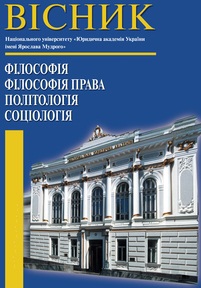ІНФОРМАЦІЙНО-КОМУНІКАТИВНА ПРИРОДА СУСПІЛЬСТВА:
ЕВОЛЮЦІЯ ТОЧОК ЗОРУ НА ПРОБЛЕМУ
INFORMATIONAL AND COMMUNICATIVE NATURE OF SOCIETY: EVOLUTION OF POINTS OF VIEW ON THE ISSUE
Author(s): Oleg Gennadiyevich Danilyan, Olexander Petrovych DzobanSubject(s): Theory of Communication
Published by: Національний юридичний університет імені Ярослава Мудрого
Keywords: information; communication; information society; information and com- munication activities; information and communicative relationship;
Summary/Abstract: Problem setting. Changes in modern society, the increasing role of information and knowledge, improvement of communication, development of network structures, etc. – generate qualitative changes in all kinds of activities at all levels. Recent research and publications analysis. The term “society” is Central to social philosophy. There are many points of view on society, its nature, system features, factors and determinants of development. In the vast majority of publications traced the idea that information and communication is actually an attribute of the information (postindustrial) society. Therefore, in this article attempt to justify attributional information and commu- nication processes throughout the Genesis companies. Paper objective. The purpose of the article is justification attributional information and communication processes of social development. Paper main body. Society is a system of entities related communication processes. Life and human activity is impossible or extremely limited outside of society. The need for communication is among basic human needs, it dictates the behavior of people with no less authority than, for example, so-called vital needs. Communication is a necessary condition for the normal development of a person as a member of society, as individuals. In social-philosophical discourse has formed two approaches to the consideration of communications – the mechanistic and activity. From the position of the mechanistic ap- proach, communication is understood as a unidirectional process of transmission and reception of information through encoding and decoding, respectively. Man is here viewed as a mechanism, which can be described by a finite defined rules, and external medium communication represents noise. In the framework of the activity approach communication is understood as communication, joint activities, exchange of information. Information of this position can be represented as transmission of messages in the process of interaction of the two systems, which leads to a change in their status. In the process of development of society as a system of communication and relations, acquire new characteristics, change the properties of the information that is transmitted. According to the theory of technological determinism, which removes a major role in social development, science and technology, the development of society up to the present time occurs in three stages: the preindustrial, industrial and postindustrial. Pre-industrial society is characterized by an agrarian mode of production; the industrial society – the machinery of production, scientific organization of labour, free trade, a unified system of national economy. In post-industrial society the key role of knowledge and information. Class division is changing the professional service sector dominates the sphere of production. Conclusions of the research. The nature of society is the information and communication, complexity of social structure is directly dependent on complexity and expansion of information and communication linkages. Information and communication society is accompanied at all stages of its evolution. The basis of the historical development of society is complications information and communication information and communication activities.
Journal: Вісник НЮУ імені Ярослава Мудрого. Серія: Філософія, філософія права, політологія, соціологія
- Issue Year: 38/2018
- Issue No: 3
- Page Range: 8-20
- Page Count: 13
- Language: Ukrainian

